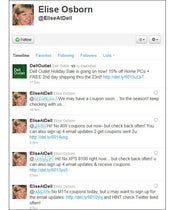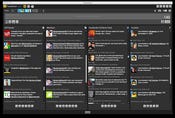Yammer CEO Challenges Copycats, Promotes Enterprise Social NetworkingYammer CEO Challenges Copycats, Promotes Enterprise Social Networking
David Sachs, a former PayPal executive, uses consumer Web app smarts and grassroots marketing tactics to take on rivals like Salesforce.com's Chatter, Socialtext, and IBM and its Lotus division.


Businesses Take Action With Twitter
(click image for larger view)
Slideshow: Businesses Take Action With Twitter
Yammer CEO David Sachs sounds a bit grumpy talking about the "copycats" trying to duplicate his firm's enterprise social networking service, which he insists is way ahead of all imitators.
Yammer is a corporate Twitter, allowing companies to encourage microblogging-style message sharing among coworkers within a company domain rather than with friends around the world. The product goes deeper than tweets, with directory integration and file sharing capabilities for corporate customers. Still, at least on the surface, that doesn't sound like a difficult technology to duplicate, and other companies are certainly trying.
In the past few months, Salesforce.com has introduced Chatter.com, the standalone service of the microblogging application it originally created for conversations among sales and support teams, and Socialtext has appealed to Yammer users with an aggressive pricing and migration package. Companies with decades of experience in enterprise collaboration technology, such as IBM and its Lotus division, have added status updates as another means of stimulating conversations within a company.
One recent MIT Technology Review profile was titled Yammer Gets Workers Hooked First, Then Woos Bosses. That's a reference to letting anyone at a company create a Yammer account and start using the service to collaborate with co-workers who have email addresses at the same domain--often leaving company leaders to discover after the fact that the system is turning into a de facto standard. By then, Yammer hopes the system will have proven so useful in this ad hoc fashion that corporate customers will sign up in order to assert more control over the system and get a higher level of integration. On the other hand, competitors who stick to a more traditional sales model are quick to emphasize how much better they cater to chief information officers who want to remain in control of their technology.
We began our interview with Sachs with a discussion of the sales model and what it means for Yammer and the enterprise.
Carr: So, you hook the users and bring the bosses in later?
Sachs: A lot of bosses use Yammer, too--on the free and the paid plan. The real point is you can try it before you buy it. I just think that's so important. The first step in the evolution of enterprise software moving applications to the cloud is you get rid of a lot of installation, maintenance, and compatibility issues. Once the applications are there, and they don't require all this complex installation, you might as well just let people try it. The alternative to that is you're relying on the claims of salespeople. People want to be able to try it first--that's certainly how it works in the consumer space.
Carr: Do you come out of the enterprise software world?
Sachs: I was the original COO of PayPal, from 1999 up until 2002 when we sold it to eBay. Then I created another company called Geni, which has a collaborative application for doing genealogy. So my background is more in the consumer Internet, and that's true of some of the other co-founders. We have brought a lot of that thinking into the enterprise.

Top 20 Apps For Managing Social Media
(click image for larger view)
Top 20 Apps For Managing Social Media
Carr: Did you have to also bring in people with enterprise expertise?
Sachs: I would say we've become attuned to the enterprise mindset. And we do have a lot of people who are more attuned to the enterprise mindset, especially on the sales and customer service side of the house. We've learned a lot these last few years, and by now it's one of the major differentiators for Yammer as opposed to some of these other copycat products. We have really robust tools for IT, with 50-plus features for directory integration, SharePoint integration, single sign-on, data export for e-discovery--lots of tools for enterprises. As I say, at this point it's a major differentiator for us that we're much more enterprise than the copycats.
Carr: Who are you calling copycats?
Sachs: Oh, there's a bunch of them. It seems every few week or months there's another press release. The one that has a lot of marketing dollars behind it is Chatter, which is a pretty blatant copy of Yammer circa 2009. First, they implemented it within Salesforce.com to be something for sales and service people to use. I don't think that's particularly competitive with what we offer. Then, around the end of January, they came out with Chatter.com, which is sort of the same thing outside of Salesforce.com. That's the one I'm saying is a copy of Yammer circa 2009. Why would you use it if not with Salesforce? It's kind of freemium without the premium.
Anyway, it's Chatter.com that I see as more directly competitive.
Carr: What about something like IBM's Lotus Connections?
Sachs: In theory, they might be competitive, but we really don't bump up against them much.
From our point of view, this is what we've done from the beginning, is this kind of feed-based communication. It's something we started thinking about in 2007 and implemented in 2008, where you have this Twitter-esque mode of communication.
A lot of people out there had various kinds of groupware and forum software and tried to reposition it as enterprise social networking. I think we were actually the first to use that term.
Carr: Aren't you potentially at a disadvantage to companies that add this capability to a suite of collaboration services that might also include unified communications--so people can see your status post and initiate a call within that interface?
Sachs: Nobody has asked us to let them make phone calls as part of Yammer--although we do have Skype integration. Integration in general is certainly one of our priorities, for things like Active Directory and SharePoint. We do not necessarily believe we have to do everything ourselves.
Carr: Is there a different style of communication your service is better for? How is it different from previous generations of groupware?
Sachs: Yammer is based on real-time communications, feed updates in real-time where people have conversations and publish messages. We also have groups--it's not incompatible in any way, there--but certainly where Yammer excels relative to other products is you can post a question on Yammer and get an answer very quickly. It's great for finding expertise in your company. Your query will find its way to the right people who are connected to people in other parts of the organization, people who can help you.
There's also the discovery aspect. With groupware, if you're invited to group, that's great, but there's nothing to really discover. With this, you can follow people, join groups, follow topics. By making it an enterprise-wide social network, we let you discover the content that's most relevant to you.
The big difference from group products that have come before is that, with those products, people could come together and join an online group. But if they didn't know about each other, there was no way for them to find each other.
About the Author
You May Also Like






